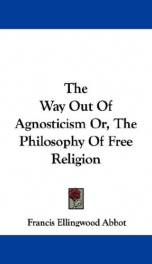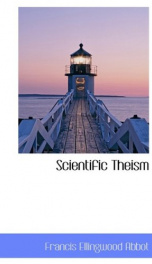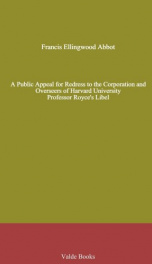Abbot Francis Ellingwood

Francis Ellingwood Abbot (Boston, November 6, 1836 – Beverly, Massachusetts, October 23, 1903) was an American philosopher and theologian who sought to reconstruct theology in accord with scientific method. As a spokesman for "free religion", he asserted that Christianity, understood as based on the lordship of Christ, is no longer tenable. He rejected all dogma and reliance on Scriptures or creeds, teaching the truth is open to every individual. Abbot graduated from Harvard University and the Meadville Theological School. He served Unitarian churches in Dover, N.H., and Toledo, Ohio, but his ministry proved controversial, and in 1868 New Hampshire's highest court ruled that the Dover, New Hampshire, First Unitarian Society of Christians' chosen minister was insufficiently "Christian" to serve his congregation. See Hale v. Everett, 53 N.H. 9 (1868). The Rev. Abbot had, it said, once preached that: In another sermon, the court noted, Rev. Abbot had even declared that "If Protestantism would include Mr. Abbot in this case," New Hampshire's highest court concluded, Hale v. Everett, 53 N.H. 9, 87-88 (1868). But opinions concerning Abbot diverged widely. Frederick Douglass, for example, praised Frank Abbot for doing "much to break the fetters of religious superstition, for which he is entitled to gratitude." Letter from Hon. Frederick Douglass to Rev. M.J. Savage (June 15, 1880), published in Farewell Dinner to Francis Ellingwood Abbot, on Retiring from the Editorship of "The Index" 48 (George H. Ellis, 1880). Following the controversy in New Hampshire, Abbot left the ministry in 1868 to write, edit, and teach. Abbot's theological position was stated in "Scientific Theism" (1885) and "The Way of Agnosticism" (1890). He committed suicide by taking poison at his wife's gravesite in Central Cemetery, Beverly, Massachusetts, on the 10th anniversary of her death.
do you like this author?
What readers are saying
What do you think? Write your own comment on this book!
write a commentWhat readers are saying
What do you think? Write your own comment on this author!
write a commentBook list

A Public Appeal for Redress to the Corporation and Overseers of Harvard UniversityProfessor Royce's Libel
Series:
Unknown
Year:
Unknown
Raiting:
4.5/5
Show more
add to favoritesadd In favorites

the way out of agnosticism or the philosophy of free religion
Series:
Unknown
Year:
Unknown
Raiting:
4/5
This scarce antiquarian book is included in our special Legacy Reprint Series. In the interest of creating a more extensive selection of rare historical book reprints, we have chosen to reproduce this title even though it may possibly have occasional imperfections such as missing and blurred pages, missing text, poor pictures, markings, dark backgrounds and other reproduction issues beyond our control. Because this work is culturally important, we have made it available as a part of our commitment to protecting, preserving and promoting the world's literature.
Show more
add to favoritesadd In favorites

scientific theism
Series:
Unknown
Year:
Unknown
Raiting:
3/5
1886. Contents Part I. The Philosophy of Science: The Presuppositions of the Scientific Method; The Theory of Phenomenism; and The Theory of Noumenism; Part II. The Religion of Science: The Principles of Scientific Theism; The Universe: Machine or Organism?; and The God of Science. --This text refers to an alternate Paperback edition.
Show more
add to favoritesadd In favorites
Book list

A Public Appeal for Redress to the Corporation and Overseers of Harvard UniversityProfessor Royce's Libel
Series:
Unknown
Year:
Unknown
Raiting:
4.5/5
Show more
add to favoritesadd In favorites

the way out of agnosticism or the philosophy of free religion
Series:
Unknown
Year:
Unknown
Raiting:
4/5
This scarce antiquarian book is included in our special Legacy Reprint Series. In the interest of creating a more extensive selection of rare historical book reprints, we have chosen to reproduce this title even though it may possibly have occasional imperfections such as missing and blurred pages, missing text, poor pictures, markings, dark backgrounds and other reproduction issues beyond our control. Because this work is culturally important, we have made it available as a part of our commitment to protecting, preserving and promoting the world's literature.
Show more
add to favoritesadd In favorites

scientific theism
Series:
Unknown
Year:
Unknown
Raiting:
3/5
1886. Contents Part I. The Philosophy of Science: The Presuppositions of the Scientific Method; The Theory of Phenomenism; and The Theory of Noumenism; Part II. The Religion of Science: The Principles of Scientific Theism; The Universe: Machine or Organism?; and The God of Science. --This text refers to an alternate Paperback edition.
Show more
add to favoritesadd In favorites

professor royces libel a public appeal for redress to the corporation and over
Series:
Unknown
Year:
Unknown
Raiting:
4.5/5
Show more
add to favoritesadd In favorites

A Public Appeal for Redress to the Corporation and Overseers of Harvard University
Series:
Unknown
Year:
Unknown
Raiting:
5/5
A Public Appeal for Redress to the Corporation and Overseers of Harvard University. Professor Royce's Libel. please visit www.valdebooks.com for a full list of titles --This text refers to the Kindle Edition edition.
Show more
add to favoritesadd In favorites
What readers are saying
What do you think? Write your own comment on this author!
write a commentif you like Abbot Francis Ellingwood try:
readers also enjoyed
What readers are saying
What do you think? Write your own comment on this author!
write a commentGenre
if you like Abbot Francis Ellingwood try:
readers also enjoyed
Do you want to read a book that interests you? It’s EASY!
Create an account and send a request for reading to other users on the Webpage of the book!

